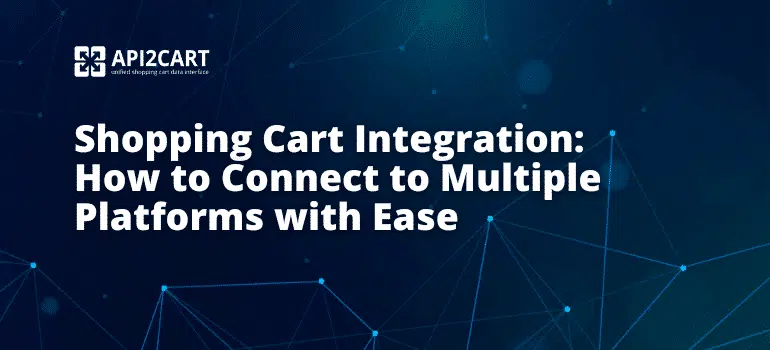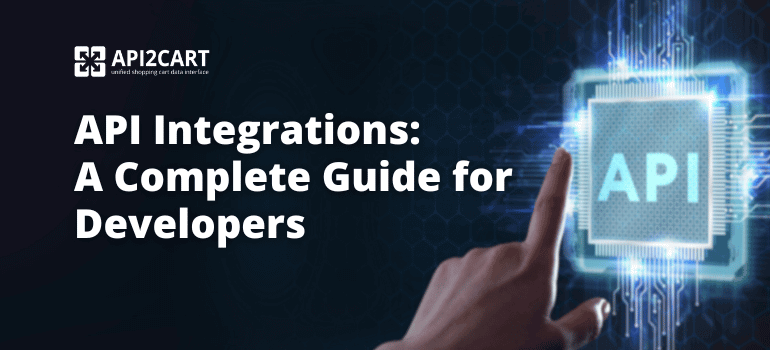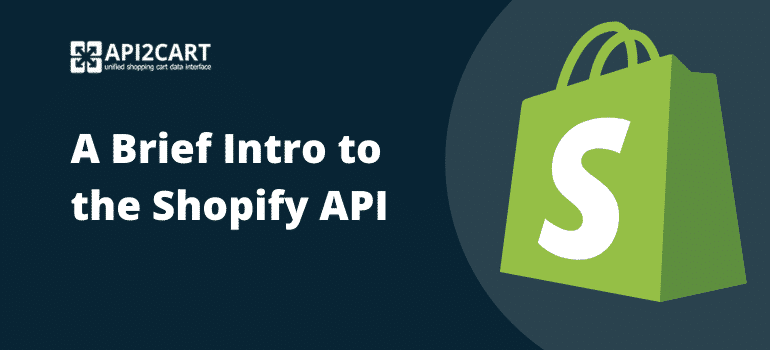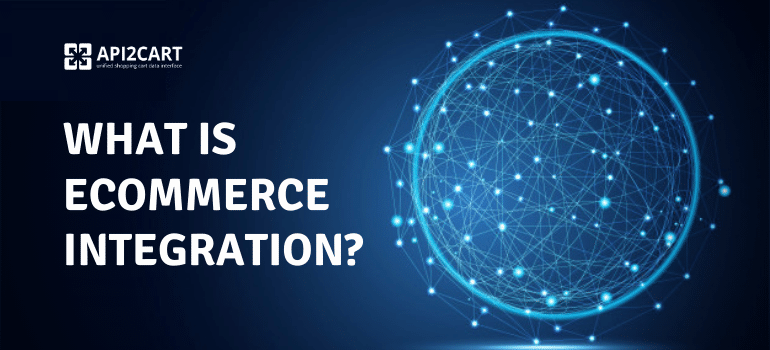
Are you developing a software solution or app that automates various business processes for online store owners? If so, shopping cart API integration should be one of your top priorities. Without this integration, your software won’t be able to access the core data of your clients' stores, which limits functionality and reduces business opportunities. With a seamless shopping cart API, your solution can unlock vital features such as order management, inventory updates, and customer data synchronization.
Today, there are over 30 million eCommerce stores powered by a variety of shopping cart platforms. As a result, developing multiple shopping cart API integrations will help your software expand its client base and increase market share. The more platforms you integrate with, the better your chances of meeting the needs of diverse online merchants.
In this article, we will explore why multiple eCommerce platform integrations are essential for your product’s success. Additionally, we’ll show you how to simplify this process with a ready-made universal shopping cart API solution.
What is the Shopping Cart API?
A shopping cart API (Application Programming Interface) provides access to various types of store data. This includes orders, products, customers, shipments, categories, and more. For B2B SaaS providers, the shopping cart API offers a wide range of opportunities to enhance software capabilities and provide seamless functionality for clients.
For instance, if you are an inventory management software vendor, you need access to inventory data and the ability to synchronize it across all sales channels. With a shopping cart API, you can retrieve this data directly from the connected shopping carts.
When your software integrates with these platforms, it becomes possible to retrieve essential information from e-stores. The shopping cart API acts as the intermediary that facilitates data transfer between the eCommerce software and the shopping cart system. A simple shopping cart API example is when your software automatically imports orders from platforms like Shopify or updates inventory levels on Magento in real-time.
What is Shopping Cart Integration?
Shopping cart integration refers to the process of connecting different software or apps with shopping platforms. The list of supported platforms may include Magento, Shopify, WooCommerce, and others.
Why is shopping cart integration so crucial for eCommerce software providers working with online store owners? Online shopping carts have become the backbone of both B2C and B2B eCommerce. For e-retailers, they play a central role. The platform they choose is the foundation of their e-stores and where they conduct most of their business processes. Once a vendor's business reaches a certain scale, many begin utilizing various B2B services to streamline operations.
They use solutions for order, inventory, and warehouse management, shipping, email marketing, and more. However, none of these services can operate effectively without access to their customers' e-store data. That’s why integration with shopping carts is necessary. How well this integration is implemented and its success depends on the platforms the software owner decides to integrate with.
Main Types of Online Shopping Cart Solutions
Shopping cart software is essential for businesses that want to sell products or services online. There are several types of shopping cart software available, each serving different needs. Below are the main types:
1. Hosted Shopping Cart Software
- SaaS (Software as a Service): These are cloud-based platforms where the software is hosted and managed by a third-party provider. Popular examples include Shopify, BigCommerce, and Wix.
2. Self-Hosted Shopping Cart Software
- Open-Source Platforms: These platforms are free to use, and the code is open for modification. Examples include WooCommerce (for WordPress), Magento, PrestaShop, and OpenCart.
- Licensed Software: Some self-hosted solutions are offered as licensed software, where you pay a one-time fee for the software. Examples include CS-Cart and X-Cart.
3. Enterprise-Level E-commerce Platforms
- These are robust solutions designed for large businesses with high-volume sales. Examples include Salesforce Commerce Cloud (formerly Demandware) and SAP Commerce Cloud (formerly Hybris).
4. Marketplace Platforms
- These solutions are designed for businesses that want to sell their products on multiple online marketplaces like Amazon, eBay, and Walmart.
What Is The Best Shopping Cart Platform?
Shopping platforms provide the essential tools for merchants to build and manage their online stores. These platforms serve as an interface between the eCommerce website and its infrastructure, allowing businesses to manage products, orders, customers, and other key data.
Why Integrating with Multiple Shopping Platforms Matters
Connecting your software to multiple shopping platforms brings numerous benefits, particularly for B2B eCommerce software providers. With integration, your solution can provide features like inventory and order management, marketing automation, repricing, shipping management, and more.
To successfully help e-store owners automate their operations, these services need access to data from their shopping carts. This is why **shopping cart integrations** are essential. The more platforms you integrate with, the more complete and valuable your solution becomes for online merchants.
Top 5 Shopping Cart Platforms to Integrate With
When considering shopping cart software integration, it’s important to focus on the top platforms that power millions of online stores:
- Magento
- WooCommerce
- Shopify
- OpenCart
- PrestaShop
For example, more than 100,000 store owners use Magento, while WooCommerce powers over 30% of all e-stores. Shopify has over 2.5 million merchants globally, operating in 175 countries.
Gain a Competitive Advantage by Expanding Integration
Integrating with these top platforms opens up opportunities to serve a wide range of e-store owners. However, many competitors may already support these platforms. To gain a competitive edge, consider integrating with additional platforms that your competitors may not yet support.
Less Popular Shopping Cart Solutions but Widely Used Worldwide
While the top 5 shopping cart platforms dominate the eCommerce market, there are several other solutions that also power a significant number of online stores. Some of these platforms are more popular in specific regions, while others have a global presence.
Region-Specific eCommerce Solutions
For example, eCommerce platforms like Gambio, Zen Cart, and Hybris are particularly favored by users in German-speaking countries and other parts of Europe. Integrating with these platforms would be beneficial for businesses looking to expand into or strengthen their presence in the European market.
Gambio powers over 10,000 e-stores and is highly popular in Germany. Zen Cart has more than 38,000 e-merchants using it, with strong success in countries like Germany, France, Italy, and Spain. Learn more about Zen Cart.
Global eCommerce Solutions
Platforms like Squarespace, Ecwid, and osCommerce are also widely used worldwide. These solutions can be a great option for expanding your client base, especially if you're targeting markets like Australia or Canada. Integrating with these platforms will help you provide services to a more diverse range of online merchants.
Opportunities in a Niche Market
While these less popular platforms may serve a smaller clientele compared to the industry giants, they still collectively power over a million online stores. Offering services tailored to these platforms can help you stand out from your competitors by serving customers they may not be targeting.
Don't Forget About The Integration with Marketplaces
In addition to integrating with shopping carts, connecting your software to various marketplaces is equally important. This integration brings great benefits to your B2B SaaS solution, helping your business grow while providing access to a larger pool of potential customers. For your clients, it streamlines operations, allowing them to manage their eCommerce businesses more efficiently by centralizing all their data in one place.
Focus on the Leading Marketplaces
When considering marketplace integrations, focus on the major players like Amazon, Etsy, eBay, and Walmart. These global marketplaces reach millions of sellers and billions of consumers worldwide. They provide significant opportunities for growth and a larger audience for your clients' products.
The Growing Importance of Marketplaces in 2026
In 2025, the number of merchants using marketplaces has risen dramatically. Many online sellers are now actively seeking services like yours to automate their business processes and improve their efficiency. This surge in demand presents a unique opportunity for you to expand your software’s capabilities by integrating with these marketplaces.
Don't miss out on the chance to enhance your service offerings and capture a larger share of the market by adding marketplace integrations to your solution.
What are the Main Difficulties with Integration?
Integrating with eCommerce platforms can be challenging, especially when done manually or without the help of third-party solutions. Here are some of the main difficulties you might face when developing shopping cart integrations:
1. High Costs of Integration
Developing integration with each eCommerce platform can cost thousands of dollars. Additionally, maintaining these integrations over time adds to the overall cost. For businesses aiming to scale, this can quickly become a major financial burden.
2. Time-Consuming Development
It typically takes about a month to establish one integration. If you need to integrate with multiple platforms, the process becomes even longer. Waiting for each integration to be developed and tested could result in lost opportunities and potential clients.
3. Issues with Platform Updates
One of the common challenges in eCommerce integration is when shopping platforms release new versions. These updates may cause discrepancies in the data being retrieved or may require you to modify the existing code to ensure everything runs smoothly.
4. API Limitations and Documentation Issues
Different eCommerce platforms and marketplaces have varying quality when it comes to APIs. For example, the Amazon API is outdated, and its documentation can be difficult to understand. Magento's API integration can be complicated due to inaccuracies in the documentation. Similarly, Etsy's API documentation is sparse, often requiring additional time for development and troubleshooting.
5. Skilled Developer Shortage
Creating robust integrations requires skilled developers with experience in working with APIs and eCommerce platforms. These professionals are often difficult to find, especially when dealing with complex technological requirements.
6. Security Risks
When manually developing integrations, there are potential security risks. Weak integrations can leave your software vulnerable to cyberattacks, putting sensitive data at risk.
A Complete Set of Shopping Platforms
Integrating with both leading and less popular shopping platforms significantly increases your chances of success. By offering support for multiple platforms, you can expand your service reach globally, providing access to a wider range of e-retailers who would benefit from your software.
Establishing connections with various shopping platforms not only boosts your market share but also enhances the functionality of your business. With seamless integration, you can retrieve, add, update, and delete store data across different platforms, streamlining processes for your clients.
Furthermore, the ability to integrate with multiple platforms allows you to offer new features that are highly valuable for e-retailers, helping them improve their operational efficiency and grow their online businesses.
How to Integrate with Shopping Cart Solutions Easily?
To enable eCommerce applications and B2B solutions to use store data, most shopping carts provide their APIs. These APIs allow your services to connect and retrieve various data from the stores.
However, the process of integration can be complex and time-consuming. Finding an experienced developer to build these integrations can take a lot of effort, time, and financial resources. Furthermore, ongoing maintenance is needed as shopping platforms release updates and new versions.
Instead of handling this process yourself, a simpler and faster solution is available through API2Cart. It offers a universal shopping cart API that allows you to connect with over 60 shopping carts, including popular platforms like Magento, WooCommerce, Shopify, OpenCart, and PrestaShop. With a single integration, you'll gain access to the data of stores on all these platforms.
Example of Shopping Cart API Integration: Update Product Info
One of the popular functions of eCommerce SaaS is updating product info. API2Cart allows to easily update needed product data via product.update method. This functionality enhances the flexibility of your solution and provides benefits to eCommerce merchants.
Here is an example of how the request structure of this method looks like:
{
"id": "10",
"model": "bag_01",
"sku": "bag_01",
"name": "Pancil",
"description": "New product description",
"short_description": "Short description. This is very short description",
"price": 99.9,
"old_price": 99.9,
"special_price": 56.9,
"sprice_create": "2018-08-25 23:56:12",
"sprice_expire": "2018-08-25 23:56:12",
"cost_price": 65.9,
"fixed_cost_shipping_price": 5.5,
"retail_price": 6.9,
"tier_prices": [
{
"quantity": 0,
"price": 0
}
],
"reserve_price": 65.9,
"buyitnow_price": 65.9,
"taxable": false,
"tax_class_id": "9",
"type": "simple",
"status": "disabled",
"condition": "Like New",
"visible": "search",
"in_stock": true,
"avail": true,
"avail_from": "2029-10-25T15:54:37-0500",
"product_class": "Shirts",
"brand_name": "Abidas",
"available_for_view": false,
"measure_unit": "Piece",
"unit_price": 10.5,
"stores_ids": "1,2",
"store_id": "1",
"lang_id": "3",
"quantity": 6,
"reserve_quantity": 1,
"manage_stock": false,
"backorder_status": "true",
"increase_quantity": 4,
"reduce_quantity": 4,
"low_stock_threshold": 1,
"warehouse_id": "1",
"weight": 23.69,
"weight_unit": "lb",
"height": 56.12,
"length": 56.12,
"width": 56.12,
"dimensions_unit": "cm",
"is_virtual": false,
"is_free_shipping": true,
"gtin": "12345678912345",
"upc": "9770317847001",
"mpn": "9770317847001",
"ean": "5901234123457",
"isbn": "9783161484100",
"barcode": "9770317847001",
"manufacturer": "Samsung",
"manufacturer_id": "1",
"categories_ids": "23,56",
"related_products_ids": "4,5",
"up_sell_products_ids": "4,5",
"cross_sell_products_ids": "4,5",
"meta_title": "category,test",
"meta_keywords": "category,test",
"meta_description": "category,test",
"seo_url": "some seo url",
"search_keywords": "key1,key2,key3",
"tags": "tag1,tag2",
"delivery_code": "24uurs-23",
"package_details": {
"measure_unit": "string",
"weigh_unit": "string",
"package_depth": 0,
"package_length": 0,
"package_width": 0,
"weight_major": 0,
"weight_minor": 0,
"shipping_package": "string"
},
"country_of_origin": "123456",
"harmonized_system_code": "123456",
"shipping_template_id": 0,
"processing_profile_id": "`12345678`",
"when_made": "made_to_order",
"is_supply": true,
"downloadable": false,
"materials": "materials[0]=Aluminum&materials[1]=Brass",
"auto_renew": false,
"on_sale": false,
"production_partner_ids": "4,5",
"manufacturer_info": {
"name": "string",
"address": "string",
"phone": "string",
"email": "string"
},
"report_request_id": "105245017661",
"disable_report_cache": false,
"reindex": true,
"clear_cache": true,
"check_process_status": false,
"specifics": [
{
"name": "string",
"value": "string",
"values": [
"string"
],
"used_for_variations": false,
"scale_id": null,
"input_value": null,
"food_details": {
"calories": 0
},
"group_products_details": [
{
"id": "string",
"quantity": 1
}
],
"booking_details": {
"location": "string",
"type": "date",
"session_duration": 0,
"session_gap": 0,
"sessions_count": 0,
"time_strict_value": 0,
"time_strict_type": "days",
"availabilities": [
{
"day": "sunday",
"is_available": true,
"times": [
{
"from": "06:25",
"to": "13:34"
}
]
}
],
"overrides": [
{
"day": "sunday",
"date": "1969-03-03"
}
]
}
}
],
"shop_section_id": 12345678,
"personalization_details": {
"is_personalizable": true,
"personalization_is_required": true,
"personalization_char_count_max": 0,
"personalization_instructions": "string"
},
"external_product_link": "http://example.com/t-shirt",
"marketplace_item_properties": "{\"color\":[\"Silver\"],\"manufacturer\":\"Philips\",\"features\":[\"3 way\"],\"countPerPack\":1,\"watts\":{\"unit\":\"W\",\"measure\":40}}",
"min_order_quantity": 1,
"idempotency_key": "098f6bcd4621d373cade4e832627b4f6"
}
For more detailed information on this and other API methods, check out our complete API Documentation.
API2Cart supports a wide range of eCommerce integrations and over 100 API methods. These methods allow you to import orders, update products, synchronize inventory, manage customers, and much more with ease.
Want to try API2Cart for free? Sign up!
FAQs
What is shopping cart integration and why is it essential for eCommerce software providers?
Shopping cart integration connects your software or app with different eCommerce platforms to access critical store data such as products, orders, and customers. This integration is essential because it allows eCommerce software providers to offer seamless functionality for store owners, automating processes like inventory synchronization, order management, and more. By integrating with multiple platforms, you can expand your customer base and enhance your solution's value.
How can integrating with multiple eCommerce platforms benefit my software business?
By integrating with multiple eCommerce platforms, such as Magento, Shopify, WooCommerce, and more, your software can handle data from various sources in one unified system. This improves the functionality of your software, allowing you to offer a more comprehensive solution to clients. You will be able to provide real-time synchronization, manage orders, products, and inventory, and expand your customer base by serving store owners across various platforms.
How can API2Cart simplify the process of integrating with multiple shopping carts?
API2Cart offers a unified API that allows you to integrate your software with over 60 popular eCommerce platforms, including Shopify, Magento, WooCommerce, and PrestaShop, in a single integration. Instead of building separate connections with each platform, API2Cart simplifies the process by providing one API with over 100 API methods to manage orders, products, customers, inventory, and more. This saves time, reduces costs, and ensures that your software remains up-to-date with minimal effort.
Which eCommerce API aggregators offer easy integration with major shopping carts?
API2Cart provides a unified API that simplifies connecting your software with 60+ eCommerce platforms and marketplaces, including Shopify, Magento, WooCommerce, BigCommerce, PrestaShop, Wix, Etsy, OpenCart, Shopee, Temu, Flipkart, TikTok Shop, and and many others, at once - all through a single integration. It allows you to seamlessly access, sync and manage important store data, orders, products, customers, inventory, shipments, and more, across multiple platforms. This makes the eCommerce integration process faster, cost-effective, and hassle-free.



